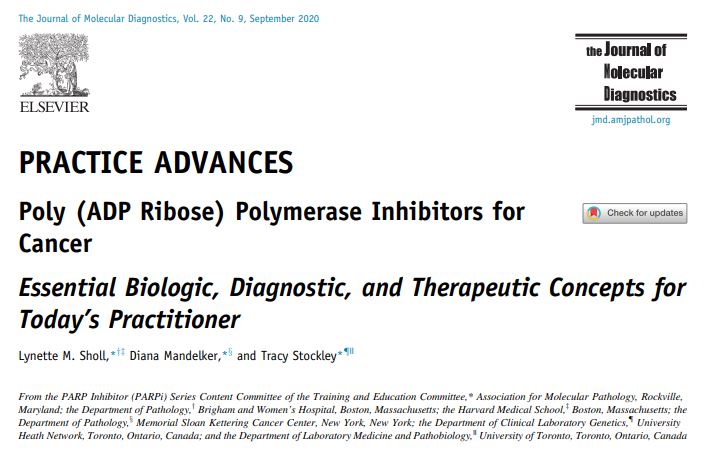Targeting DNA Repair Pathways: Current and Future Implications of PARP Inhibitors

Many recent studies have highlighted the importance of DNA repair pathways and the significance of PARP inhibitors. Using Homologous Recombination Deficiency (HRD) testing, ovarian and breast cancers are currently the most well studied for the subsequent use of PARP inhibitor (PARPi) therapy. More information is emerging regarding HRD testing in prostate and pancreatic cancers, and clinical trials for PARP inhibitor therapy applications in these diseases are underway as well. AMP subject matter experts will organize known scientific underpinnings and the most current research and clinical information into an up-to-date and useful three-part webcast series titled, “Targeting DNA Repair Pathways: Current and Future Implications of PARP Inhibitors” This series will cover:
- The mechanism of action of PARP inhibitors and the science of Homologous Recombination Deficiency (HRD) testing,
- Laboratory considerations (from sample acquisition to result reporting) for HRD testing, and
- Clinical considerations for testing and treatment and the need for genetic counseling.
The targeted audience includes clinical laboratory professionals, oncologists, and genetic counselors as well as many other healthcare professionals engaged in the diagnosis, treatment, and care of cancer patients.
LEARNING OBJECTIVES
- Explain homologous DNA repair mechanisms and the mechanism leading to repair deficiency.
- Define the mechanism of PARPi function.
- Employ best practices to identify optimal specimen type for molecular diagnostic testing.
- Describe the most appropriate molecular test to be performed and its performance characteristics.
- Discuss strategies for the appropriate and timely use of PARPi.
- Facilitate discussion of when and how to implement genetic counseling prior to testing for germline mutations associated with PARPi response.
Get the Entire Series
Speaker: Ryan Jensen, PhD
Webinar #2: Identifying Mutational Signatures of Homologous Recombination Deficiency to Predict PARPi Response
Speaker: Peter Park, PhD
Recorded: August 29, 2019
Webinar #3: PARP Inhibitors in the Clinic: The Implications of Genetic Testing for Treatment Selection and Germline Counseling
Speakers: Katherine Nathanson, MD; Payal Shah, MD
Recorded: October 22, 2019
Read the JMD manuscript outlining the series
This webinar series on PARP inhibitors was planned and coordinated by the PARPi Content Committee:
Lynette Sholl, MD
Content Committee Chair
Brigham & Women's Hospital, Boston
Diana Mandelker, MD, PhD
Memorial Sloan Kettering Cancer Center, New York City
Tracy Stockley, PhD, FCCMG, FACMG
University Health Network, Toronto
and supported by the Association for Molecular Pathology (AMP) Training & Education Committee.
Instructions for Accessing Live, Archived, and On-Demand Webinars from AMP (PDF)


















